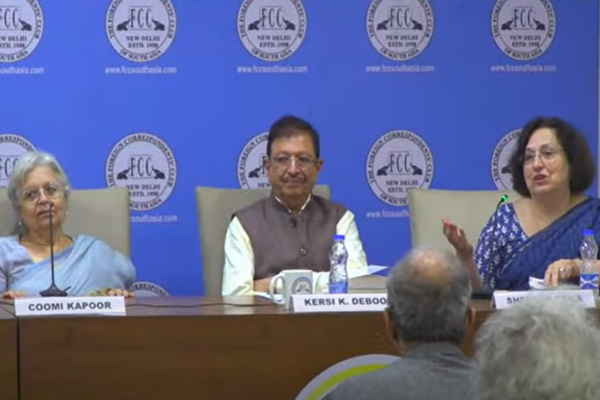On June 16, the Foreign Correspondents Club of South Asia (FCC) hosted the Bangladesh High Commissioner to India Mustafizur Rahman for a talk on ‘Bangladesh-India Relations Today’.

In his opening remarks the envoy touched on many topics like trade, culture and bilateral ties among others. “Today, Bangladesh-India ties are diversified, multifaceted, multidimensional and ever-evolving. The framework of bilateral cooperation encompasses all possible avenues, including trade and investment, power and energy, transport and connectivity, science and technology, defence and security and many more,” he said.
The envoy also answered questions to a packed house on various issues. He was asked about the upcoming elections in Bangladesh , and he replied: “Our government appreciates that international community, including the US, firmly stands by it as our government is committed to hold a free and fair election at all levels for upholding the country's democratic process.”
In response to a question regarding cross-border terrorism, the envoy clearly said that Bangladesh will not allow its territory to be used against the interests of any other country, including India. He also spoke on the Teesta water sharing issue and said that it is necessary that Bangladesh receives its fair
|
|
|
share of the Teesta waters to alleviate the sufferings and save the livelihoods of millions of people dependent on the Teesta river basin. He also expressed the hope that India, being a key country in the region, would stand by Bangladesh to find a durable solution to the Rohingya crisis.
On June 19, the FCC hosted a discussion with journalist and author Coomi Kapoor on her book, ‘The Tatas, Freddie Mercury & Other Bawas’ (An intimate history of the Parsis). It was a lively discussion where Ms. Kapoor pointed out that it was important that Parsi women marrying non-Parsi men be allowed to remain a part of the community, as an attempt to deal with the decreasing number of Parsis.

On June 26, the FCC hosted a panel discussion on 'India-Pakistan Relations: Is Peace Possible Ever?' It was a discussion on the thought- provoking book “In Pursuit of Peace: India-Pakistan Relations Under Six Prime Ministers,” by the late diplomat Satinder Kumar Lambah –who was also former Prime Minister Dr Manmohan Singh’s Special envoy for Afghanistan and Pakistan. The three panellists were: Ajay Bisaria, who served as India’s High Commissioner to Pakistan, Sanjay Baru who was Information Advisor to former PM Dr Manmohan Singh, and C Raja Mohan, author and
|
|
columnist on international affairs.

“Even though the rules of engagement have changed, it does not mean we have stopped engaging with Pakistan,” said Bisaria. We keep engaging on three tracks: through our missions, military-military and intelligence agencies. It’s just that we don’t have a structured dialogue going,” he added.
Raja Mohan talked about the India-Pakistan relations in the present context and said: “I think the Modi government came to power with the clear sense that the terms of engagement with Pakistan must be altered.” However, he pointed out that within this framework, “there was room for engagement.”
Sanjay Baru in his comments pointed out that every time there was a terror attack, there was an appeal for calm by Prime Minister Dr Manmohan Singh to “keep temperatures low in order to take these discussions forward.”
A packed house kept the questions coming for over an hour and it proved to be a lively discussion.
--Simran Sodhi
Design: Anil Yadav
|
|